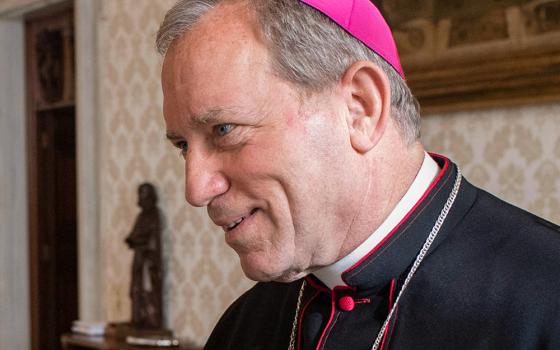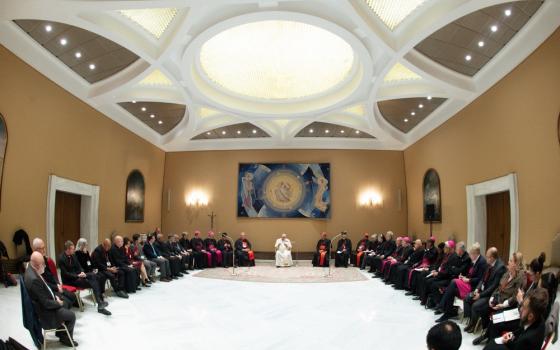
ST. LOUIS -- The room is semidark and hushed, and the movie “First Time Felon” is playing. “You make a wrong decision, you got a chance to redeem yourself,” whispers Antwan Pope, who teaches this six-week course for the Fatherhood Initiative.
On the TV screen, a boot-camp leader tells a group of prison inmates, “Life is tough. It’s hard. And nobody knows that more than you do.” In the room, heads nod. A handful of these men have been arrested; three-fourths have been addicted; all have abandoned their kids one way or another. Now they’re learning about “startin’ something and finishing it,” Pope says. “Guys give up and never try, never know their whole potential.”
The Fatherhood Initiative’s curriculum is packed with practical knowledge: how to cope with unemployment, interview for a job, save money, balance a checkbook, lower your blood pressure, get a prostate exam, clear your record of a nonviolent crime. There’s extra emphasis on managing anger, lowering stress, and coping with unemployment and life’s other slings and arrows. “They need to know about all this stuff,” Pope says, “or they start drinking and drugging, and then everything just gets worse.
“Once you get all the toxic thinking out of them, and get their attention span long enough,” he continues, “then you can start working on the healing process.” Virtually none of these men had a loving father who guided them into manhood. Life’s struggle looked hopeless from the start, drugs and easy money the only bright spot.
“It’s imperative that we nurture the love back into these men,” Pope says gravely. “Then we can teach them to parent. You don’t just run back to the house and say, ‘OK, I’m clean. I’m Daddy now.’ ”
Nonnegotiable reality
Edward McFarland started the Fatherhood Initiative in 2000, holding classes in a St. Louis YMCA. Pope met him soon after. “I was in the Salvation Army Harbor Light,” he admits, referring to a shelter in town. “I’d been trying to get clean off alcohol and drugs. But the first time, I still didn’t take it seriously. Second time, I played around. Third time, I took it for granted. Then I got shot. Guy tried to rob me. I crawled out the gangway and made it to my house.”
Seven bullets carry a certain nonnegotiable reality. He stopped using for good. McFarland remembered him from the fatherhood classes and suggested he stop by, let them know how he was doing. So he did, every month. Then McFarland said, “How would you like to work for me?”
“Me?” Pope repeated incredulously.
“Why not you? I know you don’t have an education. We will work on that.”
“Well, don’t you need someone with clinical social work?”
“What better person to talk to guys from the street?”
“You got a point there.”
McFarland died in 2005, but his program, now a division of Catholic Family Services, thrives. It’s housed in a redbrick building called Places for Fathers, surrounded by vacant buildings, bars on windows and doors, overgrown lots. The initiative’s new director, Ramona Milford, hopes some of the 140 or so men in the program will volunteer to help clean up the neighborhood. Their mission, after all, is “strengthening families and communities one man at a time.” And the community could use some help.
Milford’s also bent on expanding the six-week course into a 10-week course and deepening the curriculum, adding more on health, depression, anger management, the lack of responsible role models, and “the vicious cycle of being exposed to crime and then repeating it.”
According to case manager Tyrone Ford, two other problems crop up again and again: the relationship between the man and the mother of the child (who may have a new boyfriend, or be keeping the father from the child) and the lack of a male role model in the past. “It’s easy to say, ‘Be a man,’ but when you don’t know how? Guys say, ‘My father wasn’t there, my mother didn’t care, so I looked to the streets for support.’
“As a case manager, I’m not just focusing on how to get somebody a job,” he continues. “There are men with jobs who still have no idea how to be a parent. They’ll say, ‘Well, if I got visitation, how do I talk to them? How do I say I’m sorry for not being there?”
The program helps with custody negotiations, housing, vocational training, and substance-abuse recovery. “We keep the class size between 10 and 12,” Pope says, “ ’cause you don’t want a whole roomful of people who are all using drugs and alcohol. First thing I do in the morning with them is a meditation, ‘Let’s all pray.’ Because you never know what the day ahead holds. Then discussion, reflection, attitude.” He shakes his head slowly, with a wry, “I’ll be damned” sort of amazement. “The longer I live, the more I realize the impact of attitude on life.”
How does the program get the men to open up? “It’s other men telling them that it’s OK,” Ford says. “They have a hard time with women as it is. Growing up, they have always had to depend on a woman.”
Back in the classroom, the movie’s still rolling. The main character comes home after graduating from prison boot camp, and his woman turns her back. “She doesn’t want to be bothered with him now, ’cause he’s not hustling,” one of the men says. Another nods. “If he wasn’t on the street anymore, she’d have to work. I had that too. Everybody just walks away from you if they can’t see something they can get out of you.”
The commentary continues as the plot unfolds: “He in a halfway house or something?” “Aw, he’s scared straight right now.” When a perky job interviewer says, “Goodbye, we’ll call you,” somebody sighs: “You can look in the person’s eyes and tell when they are lyin’ to you. But you just sit there and deal with it.” When the character looks like he’s getting ready to shoot himself in the head, somebody mutters, “Won’t be the first.”
‘I learned to love myself’
“It kind of inspired me to get my life together,” says Charles Gray, who graduated from the program last year. “I had been to jail for nonpayment of child support. I wasn’t working. I had been through a battle with crack cocaine -- and vodka, and gin. The program made me think of how my life was, and it was a mess.”
Gray says he had one relapse, but he’s now been clean and sober for more than a year. Elated, his four daughters watch his stress level like mother hens, telling him, “If anything starts to bug you, let us know!”
He clears his throat. “Even during my drinking and addiction, they stood by me and said, ‘Daddy, we love you. You need to do something,’ ” he remembers. “And I tried, but I did it for the wrong reason: I was just trying to get everybody off my back.”
This time, he did it for himself. “I couldn’t keep living like that,” he says. “My life was totally unmanageable. Every dime I got, I wanted to get more drugs and alcohol. My wife was supporting the whole family, and I didn’t feel like a man anymore. She kind of kicked me out of the house a couple times, and I would stay out a week or so, and she would let me back.”
Finally, reality hit him: “I’m not employable if I’m drinkin’ and druggin’.” That’s when he started talking to Pope. “Antwan had been there before. He gave me a lot of insight, kind of loved me till I learned to love myself. Even after I relapsed.” He draws a long breath. “You gain so much freedom inside your mind and body from not using. I would have $20 or $30, and it would not last 20 or 30 minutes. Now I can make it last two or three weeks.
“Through the program, I got hooked up with a treatment center, and I got to do odd jobs and started doing landscaping. I like it,” he says. “I like things to look nice, and I like to take pride in what I do. Now I’m employed downtown, and they might keep me on permanent. I’ve been at work every day, on time. I got my will and my drive back.” He pauses. “The program kind of gave me a leg up on being a man again.”
Our society gets all tangled up trying to define manhood these days, but for Gray, now it’s simple: “Somebody can count on you.”
He talks a minute about his wife, how strong she is, how she got them through all these years. He corrects himself: “My fiancée. We’re not married. We’re going to get married next year, after being together 20 years through all the turmoils. Because now we are getting to be a normal family.”
Once, probably after yet another bender or job loss, she said to him, “If the shoe were on the other foot, if I were doing all this to you, what would you do?” Gray’s chuckle is heavy with sadness. “My first impulse was to say, ‘Well, I’m sorry, babe, I think I would’ve left you.’ She had faith in me. And I was a pretty good guy for the first eight years. When I started to change, I was dealing with some issues. My uncle raised me, I was real close to him, and he passed, and I thought, ‘I’m all alone again.’ I think I was just looking for something to kind of fill the void. And it grew and grew and got aggressive.”
Showing up for class at the Fatherhood Initiative wasn’t easy, he admits. “I thought it was going to put a lot of stress on me. But it turned out to be the best thing I’d ever done.
“It made me want to be a stand-up guy.”
[Jeannette Cooperman is a staff writer at St. Louis Magazine and St. Louis at Home.]



